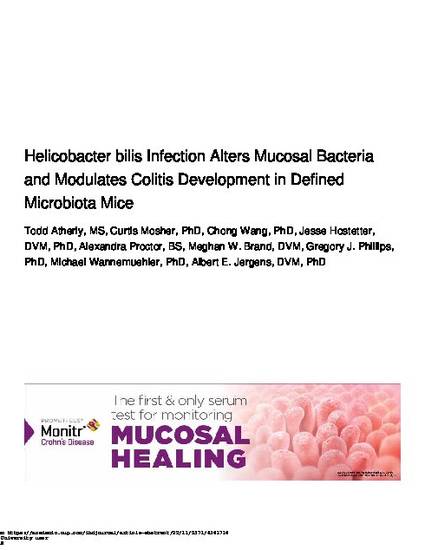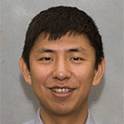
Background: Helicobacter bilis infection of C3H/HeN mice harboring the altered Schaedler flora (ASF) triggers progressive immune responsiveness and the development of colitis. We sought to investigate temporal alterations in community structure of a defined (ASF-colonized) microbiota in normal and inflamed murine intestines and to correlate microbiota changes to histopathologic lesions.
Methods: The colonic mucosal microbiota of healthy mice and ASF mice colonized with H. bilis for 3, 6, or 12 weeks were investigated by fluorescence in situ hybridization targeting the 16S ribosomal RNA genes of total bacteria, group-specific organisms, and individual ASF bacterial species. Microbial profiling of ASF and H. bilis abundance was performed on cecal contents.
Results: Helicobacter bilis–colonized mice developed colitis associated with temporal changes in composition and spatial distribution of the mucosal microbiota. The number of total bacteria, ASF519, and helicobacter-positive bacteria were increased (P , 0.05), whereas ASF360/361-positive bacteria were decreased (P , 0.05) versus controls. Adherent biofilms in colitic mice were most often (P , 0.05) composed of total bacteria, ASF457, and H. bilis. Total numbers of ASF519 and H. bilis bacteria were positively correlated (P ¼ 0.03, r ¼ 0.39 and P , 0.0001, r ¼ 0.73), and total numbers of ASF360/361 bacteria were negatively correlated (P ¼ 0.003, r ¼ 20.53) to histopathologic score. Differences in cecal abundance of ASF members were not observed.
Conclusions: Altered community structure with murine colitis is characterized by distinct ASF bacteria that interact with the colonic mucosa, by formation of an isolating interlaced layer, by attachment, or by invasion, and this interaction is differentially expressed over time.
Available at: http://works.bepress.com/chong-wang/94/

This article is published as Atherly, Todd, Curtis Mosher, Chong Wang, Jesse Hostetter, Alexandra Proctor, Meghan W. Brand, Gregory J. Phillips, Michael Wannemuehler, and Albert E. Jergens. "Helicobacter bilis infection alters mucosal bacteria and modulates colitis development in defined microbiota mice." Inflammatory bowel diseases 22, no. 11 (2016): 2571-2581. doi: 10.1097/MIB.0000000000000944.